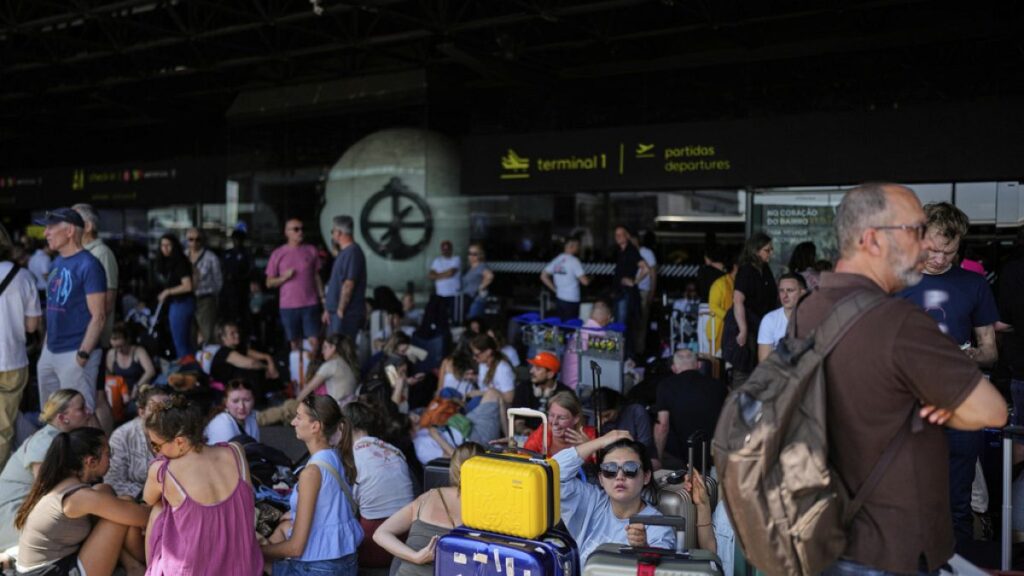The power outage that paralysed Spain and Portugal on Monday led to major travel disruption, including over 500 cancelled flights.
Thousands of travellers were left stranded, with some spending the night on airport floors.
If you experienced flight delays or cancellations, here’s what you need to know about your rights to support and compensation.
My flight was cancelled, am I entitled to compensation?
Under UK and EU law, passengers are entitled to compensation for a cancelled flight, but only if the airline is to blame, which is not the case for the power outage.
“As the disruption has been caused by circumstances outside of the airline’s control, passengers may not get any compensation directly from the operator,” according to Ernesto Suarez, CEO of travel insurance company Gigasure.
In this situation, airlines are required to provide passengers whose flights have been cancelled with support, like hotel rooms or meals.
Depending on your circumstances, you may receive some money for alternative travel arrangements, too.
Passengers are also entitled to a duty of care for flights delayed over two hours. Airlines are required to provide refreshments as appropriate after a specified length of time.
If the delay is prolonged overnight, the airline is obliged, in theory, to find and pay for accommodation. In practice, operators often claim this is “too difficult” and invite passengers to book their own and request reimbursement later.
Can I claim on travel insurance for a cancelled flight?
“Those with travel insurance may have some financial protection if all, or part of, their trip is delayed, cancelled, or cut short due to the power outage,” says Suarez.
“If the customer bought extended travel disruption cover, they may be covered for travel delay, abandoning or cutting short their trip and/or additional costs if they have to move accommodation or extend their stay.”
If passengers have already travelled and cannot return due to the power outages, many travel insurance policies will continue to provide cover until you can return at no additional charge, Suarez adds.
If you have extended travel disruption cover, you may also be entitled to compensation that covers any additional travel and accommodation costs until you can return, subject to your policy terms, conditions and exclusions.
It’s important to check the specific wording of your policy, but generally, if the delay or cancellation is outside your control, you will be able to make a claim.
Travel and insurance expert Michelle Cooper from Saga Travel Insurance urges travellers to keep a clear record of all extra expenses they incurred because of the disruption.
“It’s strongly recommended that travellers retain all receipts for accommodation, meals, and transport, along with written confirmation from airlines or travel providers about any cancellations or delays – like emails and texts,” she says.
“It may be helpful to take photos of receipts, too. These documents will be needed when submitting a claim. Where possible, take screenshots of airline communications and save copies offline too, in case internet access is disrupted.”
Compensation rights for emergency accommodation
Some travellers felt unsafe in their accommodation or were unable to access it as electronic door locks stopped working during the blackout.
“If your hotel had no working emergency lighting, air con, or fire safety systems, it may not have been safe to stay,” says Cooper.
“If you decided you needed to move, make sure to keep all receipts and evidence of why you had to leave, such as photos or written confirmation from the hotel. Keep all receipts of your new accommodation for insurance claims.”
If I choose not to travel to Spain or Portugal, am I entitled to a refund?
“You can only cancel your trip and claim on insurance if the airline or tour operator cancels your travel or the Foreign, Commonwealth & Development Office (FCDO) [or equivalent EU country’s governmental body] advises against travel to your destination,” explains Cooper.
“Otherwise, claims may not be valid. It’s a good idea to follow your tour operator’s app or social media pages for real-time updates on trip cancellations to stay informed.”
The situation in Spain and Portugal is almost fully resolved, but if you decide to change your travel plans, your existing insurance may not be valid.
“If you change your destination or travel dates significantly, you’ll need to either update your insurance policy or consider purchasing a new one to ensure you’re fully covered for your new plans,” says Cooper.
Read the full article here

